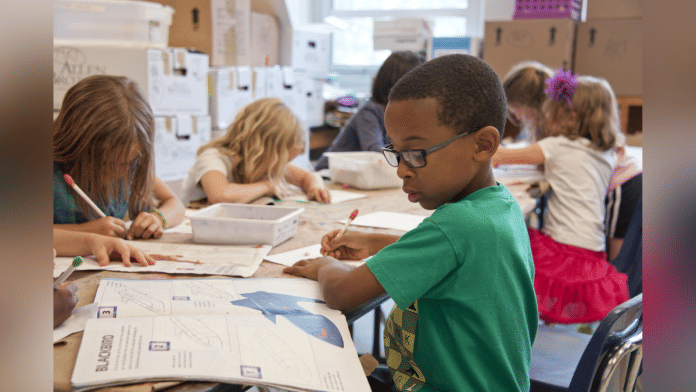We need to think differently about education. Even before the pandemic, millions of children were already behind in their learning, whether they attended school or not. We now have a deepening learning crisis on our hands. We need to make up for more than 2 trillion hours of lost learning and need local expertise and global commitments to prioritize education to fix the problem.
Not every child is learning well in school
UNICEF’s latest report suggests that across 32 low and middle-income countries, most children leave primary school lacking essential literacy and numeracy skills. Learning inequities hit the poorest and most vulnerable communities hardest. Only around a third of all students in third grade (eight and nine-year-olds) can grasp simple texts, while fewer than one in five has mastered basic numeracy. Children who miss out on quality education grow up without the skills necessary to fulfill their true potential and their lives – and their countries’ economies – suffer as a result.
The report calls on governments and partners to urgently invest in education. It lists three priorities:
-
Getting every child back into the classroom;
-
Giving them efficient means to learn so they gain more from the time spent at school; and
-
Protecting children’s safety and wellbeing.
Organizations and researchers around the world are already on the case. They’re showing us that there are scalable and sustainable solutions to effectively tackle these issues. Therefore, it is important to highlight these impactful projects in education and create a community to put momentum behind the transformation we need to make this world a better place in the future.
What’s keeping children away from school education?
The reasons children are kept away from school differ by region, culture or family. We need local expertise to solve local problems, as well as strong communities to offer a safety net for families.
When CAMFED (the Campaign for Female Education), an NGO dedicated to girls’ education, started in Zimbabwe in the 1990s, it offered scholarships so families could afford to send their daughters to secondary school along with their sons. But that wasn’t the only challenge families faced: they needed to ensure girls felt safe and stayed in school. Through the Learner Guide programme, students who were once supported by CAMFED return to their local schools to offer one-to-one education and mental support to girls at risk. As of 2022, more than 208,000 CAMFED scholars make up Africa’s largest and fastest-growing peer support and leadership network. CAMFED is committed to developing partnerships with government bodies, community leaders and civil society to support young women across sub-Saharan Africa in taking charge of their own futures.
The BRAC Bangladesh team also recognizes the power of connected communities. During pandemic lockdowns, they launched the Pashe Achhi (“beside you”) programme. Using the only widely available technology – basic mobile phones – they rang families every week. The 20-minute calls offered social and emotional support and a curriculum of play-based activities that kept young children learning, even at home.
Teaching starts at the level of the child, regardless of age or grade
In India, Pratham, a non-profit organization created to improve education quality, set out to find out how well children were learning in school and create solutions to problems facing educators. Surveying 600,000 children annually across almost all rural areas, its pioneering Annual Status of Education Report (ASER) found that many children were in school but lacking foundational skills. In response, the team developed the Teaching at the Right Level (TaRL) approach.
Using TaRL, teachers assess and group children by learning level, not grade. They use resources and activities to target foundational goals, such as reading with fluency and understanding and mastering math skills. Studies have shown that these foundational capabilities, once acquired, will endure over time and allow children to learn more quickly at school.
To supercharge learning, we need to rethink classroom culture
What motivates children to learn? If we want each student to reach their full potential, we need to make sure they feel properly welcome and supported in school. That means we need to create inclusive classrooms and a collaborative approach from teachers, parents and communities – what the OECD (Organisation for Economic Co-operation and Development) calls “co-agency”.
Mindset is also a core motivator. Thanks to growth mindset pioneer Carol S. Dweck, we know more about what motivates learning behaviours than ever before. When we create a culture where students see everything as a learning opportunity – especially mistakes – we unlock curiosity, and creativity and consistently improve learning outcomes.
Levelling the playing field and closing the digital divide
During the pandemic, while millions of students turned to online learning; millions more lacked any access. We need to urgently close these gaps by investing in hardware, connectivity, learning technologies, teacher training and parent support.
PhET Interactive Simulations is a free online learning resource that reaches pupils who might otherwise miss out on the quality STEM learning it offers. For one, there’s an offline app. The simulations are available in over 100 local languages and have inclusive features to help students learn through interaction with virtual experiments. The PhET team is reaching out to teachers in Africa and Latin America to support their professional development. Classrooms are now enriched by new possibilities, and co-agency develops between a teacher and their students to make learning fun.
Keep students at the heart of learning
We owe it to every student to make sure they are actually learning and learning well. As countries start to shift to a post-pandemic world, there is nothing more important than fair, accessible, quality education for all. It has the power to change not just individual lives, but entire economies. To achieve this, it will take a concerted global effort to keep education where it should be: at the top of everyone’s priority list.
The article originally appeared in the World Economic Forum.
Also read: CGPA instead of marks, lateral entry — Modi govt SoP to bring board parity






